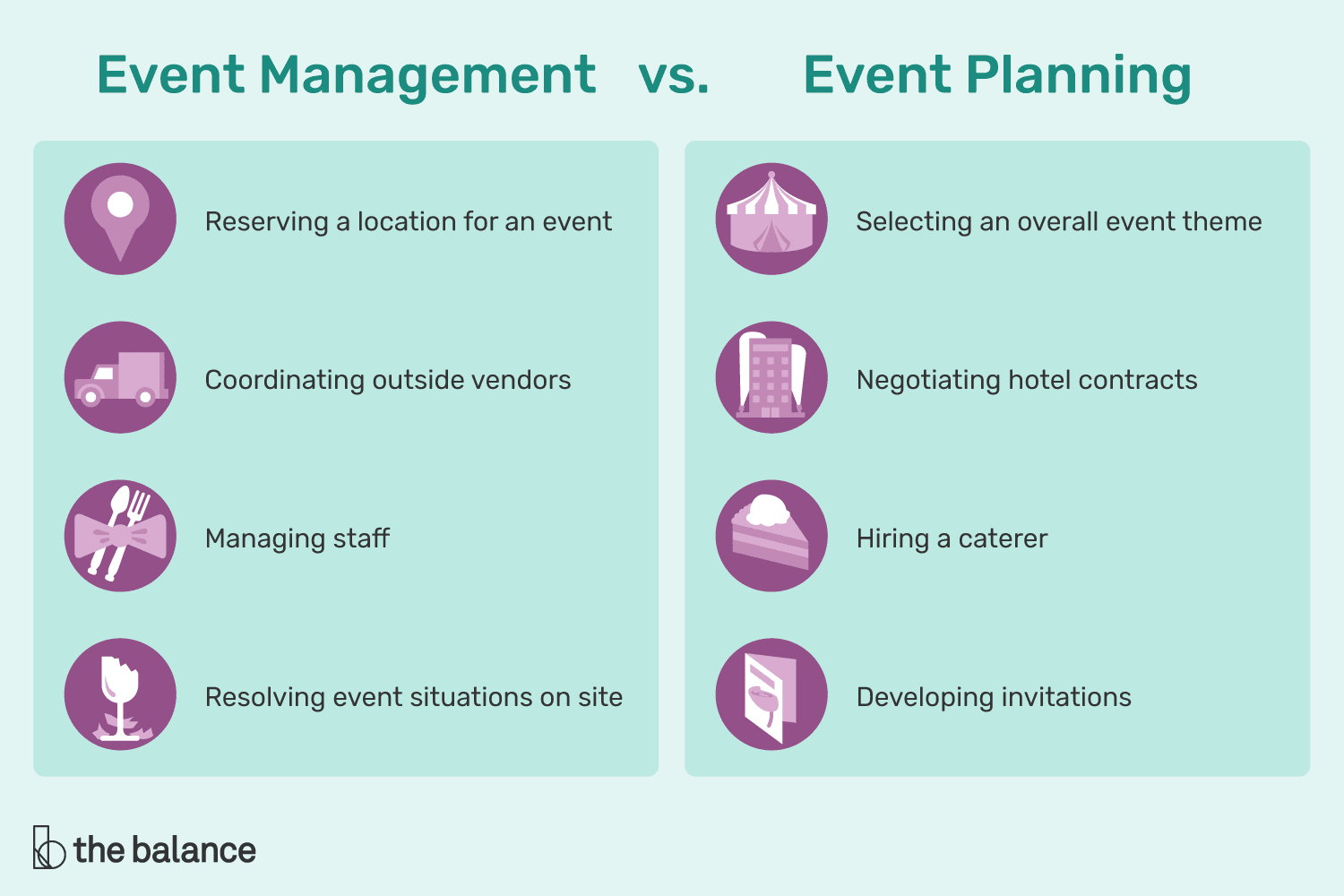What Is Event Management?
Event Management is the process of planning and coordinating various activities to ensure the successful execution of an event. It involves organizing everything from venue selection and vendor management to logistics and on-site coordination.
Event professionals oversee all aspects of an event to create a memorable experience for attendees. With meticulous attention to detail, event managers handle budgeting, scheduling, marketing, and operations to deliver a successful event. They collaborate with clients, stakeholders, and teams to create a well-executed event that meets the client’s objectives and leaves a lasting impression on attendees.
Event management requires strong organizational skills, creativity, and the ability to handle multiple tasks simultaneously. Successful event management ensures seamless coordination and brings clients’ visions to life.
What Is Event Management?
What Is Event Management?
Event management is the expert handling and execution of events, ranging from small conferences to large-scale festivals. It involves meticulous planning, organization, and coordination of various aspects to ensure the smooth execution of an event.
Definition Of Event Management
Event management, in simple terms, refers to the systematic planning and execution of events. It involves coordinating various elements such as venue selection, budgeting, scheduling, logistics, marketing, and coordination with vendors, to name a few. The aim is to create memorable experiences for attendees, leaving a lasting impression.
Key Responsibilities Of An Event Manager
An event manager plays a crucial role in the success of an event. Listed below are the key responsibilities they handle:
- Planning and Strategy: An event manager is responsible for developing a comprehensive plan, setting event goals, and creating strategies to achieve them.
- Budgeting: The event manager ensures that all expenses are accounted for and allocates the budget wisely to different aspects such as venue, catering, marketing, and entertainment.
- Venue Selection: Choosing the right venue is critical to the success of an event. The event manager evaluates different options based on requirements and negotiates contracts with the venue providers.
- Logistics: This includes managing logistics such as transportation, accommodation, and coordination with various stakeholders to ensure smooth operations before, during, and after the event.
- Marketing and Promotion: An event manager develops a marketing strategy to generate buzz, attract attendees, and create awareness about the event through various channels like social media, email marketing, and advertising.
- Vendor Management: The event manager coordinates with vendors to secure necessary services such as catering, audio-visual equipment, security, and decorations, ensuring they meet quality standards and deadlines.
- On-site Coordination: During the event, the event manager oversees everything to ensure seamless execution. They coordinate with staff, manage emergencies, handle registrations, and resolve any issues that may arise.
- Post-Event Evaluation: After the event, the event manager evaluates its success by gathering feedback from attendees, analyzing data, and identifying areas for improvement in future events.
An event manager’s role is multifaceted, requiring strong organizational and communication skills, attention to detail, and the ability to work under pressure. They bring together all the moving parts to create unforgettable events that leave a lasting impression on attendees.

Credit: ischoolconnect.com
Skills Required For Event Management
Event management is a multifaceted profession that requires a diverse set of skills. Successful event managers possess a combination of organizational, communication, interpersonal, creativity, and problem-solving skills. These skills enable them to plan and execute events seamlessly, meet client expectations, and create memorable experiences. Let’s delve into each of these skills in detail:
Organization And Time Management
Event management demands meticulous organization and effective time management. Event managers need to juggle numerous tasks simultaneously while ensuring everything runs smoothly. Strong organizational skills enable them to create detailed timelines, manage budgets, coordinate with vendors, and handle logistics efficiently. They must be adept at prioritizing tasks, maintaining schedules, and meeting deadlines to deliver successful events.
Communication And Interpersonal Skills
Effective communication and interpersonal skills are instrumental in event management. Event managers need to liaise with clients, vendors, colleagues, and attendees to ensure a seamless event experience. They must be able to clearly articulate ideas, actively listen, and collaborate effectively with various stakeholders. Strong interpersonal skills enable event managers to build relationships, negotiate contracts, resolve conflicts, and handle challenging situations with finesse.
Creativity And Problem-solving
Event management often requires out-of-the-box thinking and creative problem-solving. Event managers need to come up with unique concepts, themes, and ideas to create memorable event experiences. They must think creatively and find innovative solutions when faced with unexpected challenges. Strong problem-solving skills enable them to anticipate potential issues, devise contingency plans, and adapt quickly to changing circumstances to ensure the event’s success.
Types Of Events
Event management is the process of planning, organizing, and executing various types of events to meet specific objectives. It involves coordinating different elements and resources to create memorable experiences for attendees. This dynamic field requires effective communication, multitasking, and attention to detail to ensure the success of each event.
Corporate Events
Corporate events are organized by businesses and organizations to achieve specific goals such as networking, product launches, brand promotion, or team building. These events are carefully planned to cater to a professional audience and may include conferences, seminars, trade shows, or corporate retreats. Corporate event management includes tasks like selecting suitable venues, arranging audio-visual equipment, coordinating guest speakers, and managing event logistics.
Social Events
Social events are organized to celebrate personal milestones or special occasions. These events bring together friends, family, or communities to create lasting memories. Examples of social events include weddings, birthdays, anniversaries, baby showers, and reunions. Social event management involves coordinating with event vendors, selecting appropriate themes or decorations, organizing entertainment, and ensuring smooth execution.
Cultural Events
Cultural events showcase the unique traditions, art, and heritage of a particular community or region. These events aim to promote cultural exchange, preserve traditions, and foster a sense of community. Cultural events can include music festivals, art exhibitions, theatrical performances, or religious celebrations. The management of cultural events requires coordinating with artists or performers, securing necessary permits, managing ticket sales, and providing a platform for cultural expression.
Event Planning Process
Event management involves a comprehensive planning process to ensure the successful execution of an event. This process includes various important steps such as identifying the objective and target audience, budgeting and resource allocation, venue selection and vendor management, event promotion and marketing, as well as logistics and on-site management. Let’s dive deeper into each of these aspects to understand the intricacies of event planning.
Identifying The Objective And Target Audience
An event’s success heavily relies on defining a clear objective and identifying the target audience. The objective sets the direction and purpose of the event, whether it is to raise funds, celebrate an occasion, or create brand awareness. By understanding the target audience, event planners can tailor the experience to match their preferences and interests, ensuring maximum engagement and attendance.
Budgeting And Resource Allocation
Effective budgeting and resource allocation are essential for managing an event’s finances. Creating a detailed budget helps in tracking expenses and allocating resources efficiently. This involves identifying the necessary elements such as venue, catering, entertainment, technology, and staff, and allocating funds accordingly. By doing so, event planners can ensure that all aspects of the event run smoothly without exceeding the allocated budget.
Venue Selection And Vendor Management
The venue selection plays a crucial role in setting the tone and ambiance of an event. It should align with the event’s objective and accommodate the expected number of attendees comfortably. Additionally, event planners need to manage various vendors, such as caterers, decorators, and technical teams, to ensure that everything is coordinated seamlessly. Effective vendor management involves thorough research, negotiation, and regular communication to ensure that all requirements are met within the given constraints.
Event Promotion And Marketing
Event promotion and marketing are vital to generate awareness and attract the target audience. Utilizing various marketing channels such as social media, email campaigns, and traditional advertising helps in creating a buzz and driving registrations. Event planners should create compelling messages and visuals, showcasing the unique selling points of the event and its benefits to the attendees. By adopting a strategic marketing approach, event planners can ensure maximum visibility and participation.
Logistics And On-site Management
Managing logistics and on-site operations is crucial for a seamless event experience. This includes coordinating transportation, accommodation, and registration processes for attendees. On-site management involves supervising various aspects, such as event setup, audiovisual requirements, participant engagement, and ensuring the smooth flow of activities. By paying meticulous attention to these details, event planners can create a positive and memorable experience for all attendees.
Challenges And Trends In Event Management
Event management is a dynamic field that requires careful planning, execution, and adaptation to ensure successful outcomes. As the industry continues to evolve, event managers face various challenges and must stay updated on the latest trends to deliver memorable experiences. Let’s explore some key areas that are currently shaping the world of event management.
Managing Unexpected Situations
Events can be unpredictable, presenting event managers with unforeseen challenges. Whether it’s a sudden change in weather, technical glitches, or emergencies, being prepared for the unexpected is crucial. Event managers must maintain a proactive mindset and have contingency plans in place to mitigate any disruptive situations.
- Anticipating and addressing potential logistical issues beforehand
- Working closely with venue staff and vendors to handle last-minute changes
- Establishing clear communication channels for attendees to provide updates and directions
- Having a dedicated team to manage crisis situations efficiently
Incorporating Technology And Virtual Events
As technology continues to advance, it has become a game-changer in event management. With the increasing popularity of virtual events, event managers must adapt and harness the power of technology to enhance attendee experiences.
- Utilizing event management software for seamless registration, ticketing, and attendee management
- Integrating live streaming, virtual reality, or augmented reality to create interactive virtual experiences
- Facilitating virtual networking opportunities and interactive Q&A sessions
- Employing social media platforms and event apps to engage attendees before, during, and after the event
Sustainability And Green Events
In recent years, there has been a growing emphasis on sustainability and eco-friendliness in event management. Event managers have a responsibility to minimize the environmental impact of their events and promote sustainable practices.
- Opting for environmentally friendly venues and suppliers
- Implementing waste management strategies to reduce, reuse, and recycle materials
- Encouraging the use of digital tickets and event materials to minimize paper waste
- Partnering with local communities and charities to give back
Meeting the challenges and embracing the trends in event management is essential for creating memorable experiences that leave a lasting impact. By effectively managing unexpected situations, incorporating technology and virtual events, and prioritizing sustainability, event managers can stay ahead in this rapidly evolving field.

Credit: www.indeed.com

Credit: www.youtube.com
Frequently Asked Questions For What Is Event Management?
What Is Event Management?
Event management is the process of planning, organizing, and executing various types of events, such as conferences, meetings, weddings, and trade shows.
Why Is Event Management Important?
Event management is important because it ensures that events run smoothly, efficiently, and successfully, meeting the objectives and expectations of the organizers and attendees.
How Do Event Managers Coordinate Events?
Event managers coordinate events by managing budgets, selecting venues, coordinating with vendors and suppliers, organizing logistics, and overseeing all aspects of event planning and execution.
Conclusion
Event management encompasses a wide range of tasks and skills that are essential for organizing successful events. From planning and coordinating to executing and evaluating, event managers play a crucial role in bringing people together and creating memorable experiences. With the ability to handle multiple tasks simultaneously, attention to detail, and excellent communication skills, event managers are vital in today’s fast-paced world.
So, whether it’s a conference, wedding, or charity event, event management is the key to success.



